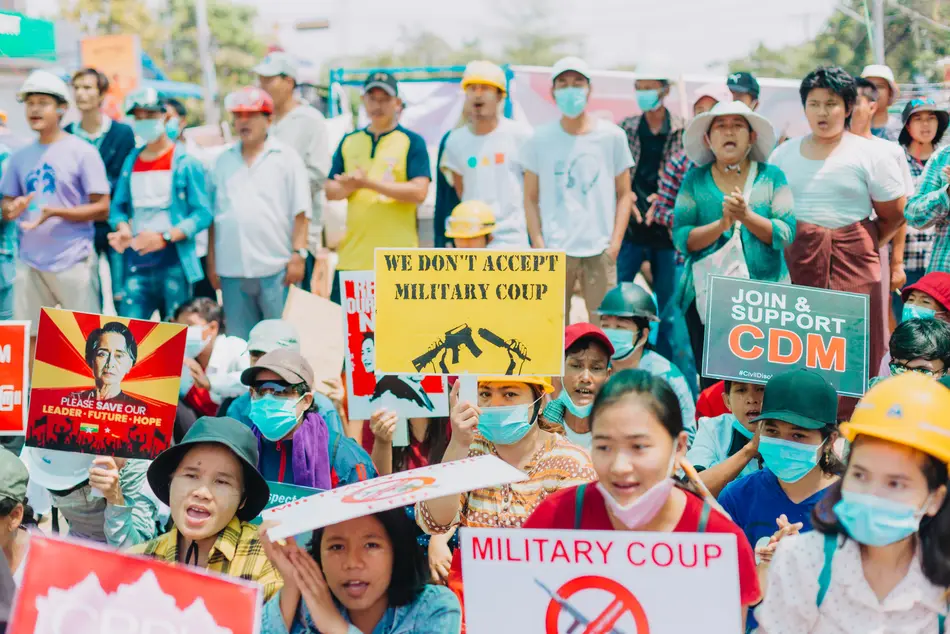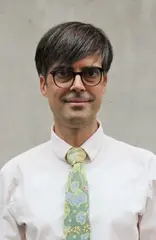This is a pre-edit version by the author Prof. Kemmerling. You can find the published version here.
In an acre of University of Yangon a bunch of twiggy trees grow on a field where once stood the student union building. The trees look thin and squalid, but they provide good shade on sunny days and a relieving breeze from intense noon heat. Amid the trees a small and modest monument commemorates the destruction of the student union building in 1962. At least 20 students were killed in this incident and many more were injured. In Myanmar’s young history as an independent nation, so strife with ethnic and regional conflict, there is one constant: teachers and students have always been at the forefront of any progressive, democratic movement and every return to autocracy has started with violent student and teacher repression.
After the February coup, Myanmar’s streets are filled with people from all walks of life protesting the usurpation of the November election results and their right to dignity, human rights, a better life. Students, workers, teachers, taxi drivers, artists, street vendors, men, women, young, old, straight, LGBT, Bamar, Mon, Karen, even Rohingya, Buddhist, Christian, Muslims and people of no faith have taken the streets in outrage. And hope. But like in many key moments of Burmese political life, activism begins with university staff and students. They are a powerful, creative, inspiring, resilient social force, having played critical roles in nation-building and the 1930 anti-colonial struggle, the 1962, to 1988 anti-coup protests (the 8-8-88 generation), even in 2021 universities, teachers and students are leading the way. So far, it is estimated that more than 30 students have lost their lives for protesting against the coup. Precious, irreplaceable lives of many people are at risk in Myanmar as once again university students and their professors are in the line of fire. There is something else at stake: the delicate progress transforming Higher Education in Myanmar is being trampled down by the military.
Myanmar is a stark example of the importance of universities in general, and the crucial importance of Social Sciences and Humanities in particular, for the flourishing of democracy. Myanmar is also a vivid example of the democratic regression we can observe in many countries across regions, from the recent massive protests around Boğaziçi University in Turkey to the ousting of Central European University in Budapest. Universities with flourishing, independent Social Science and Humanities departments are one of the prime target groups for autocracies and dictatorships. The violence against them shows how much these regimes fear critical thinking.
The special relevance of Social Sciences and Humanities in Myanmar is obvious if we look back some three decades. After the 1988 student uprising, the military regime closed most of those degrees it identified as troublemakers, especially Political Science and Sociology. At the same time the military regime converted the universities of Mandalay or Yangon, often lauded as South East Asia’s beacons of Higher Education, into small, provincial looking facilities that just few years ago hosted more stray dogs than students. For a long time, the military only allowed acceptable forms of education in the Social Sciences: docile versions of Economics and Law, unpolitical forms of Geography. The ‘stump’ of International Relations that survived is a good illustration: The only program that remained in this discipline was a postgraduate degree in diplomacy, where students were taught such important matters as what kind of presents to give to foreign ambassadors instead of a content that would equip them to understand an increasingly complex and globalized world. This culling of degrees was part of a barrage of measures to kill the critical spirit of universities. Further measures included reorganizing student’s accommodation as to limit and control their possibilities to gather and mobilize.
Against this background, the opening of the country after 2010 was remarkable. It gave universities the opportunity to reconnect to foreign universities in the Western world, exchanging faculty, hosting conferences and training in all types of disciplines including Social Sciences and Humanities. Little by little new types of degree programs were accepted. Granted, the process was slow and blocked by unwieldy structures such as an extreme centralization in Higher Education even during the governments led (effectively) by Aung San Suu Kyi. But there was hope and real change. Universities across the country started to educate students in analytical abilities and critical thinking. The generation that is now protesting on the streets is one that would find no trouble holding educated discussions about matters such as federalism, conflict, and migration with students from the universities where we, the authors, teach. What is more, these students show a deep motivation for learning and a drive to educate themselves enough to elaborate plausible proposals for a Myanmar after autocratic rule. They know how precious those spaces for open debate are and do not want to miss them anymore.
The coup has put this fledgling democracy again at the brink of extinction. From outside the options to help are limited. Nonetheless, the case of Higher Education in Myanmar tells us how important it is to support the seemingly elusive academic disciplines in Social Sciences and Humanities. To safeguard against the rising wave of autocratic backlash we see in so many countries, universities must unite in solidarity and form timely, resolute alliances with those under pressure, the true canaries in the coalmine. Once critical thinking in universities goes down, so goes liberty in general.


